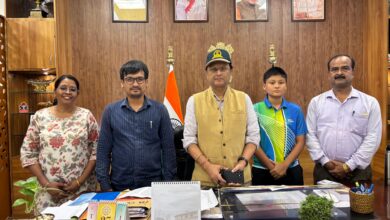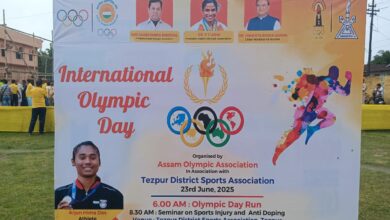The Department of Assamese, Tezpur University, organized a workshop on October 21, 2024, titled “Pre-Modern Assamese Manuscripts: Reading and Textual Criticism” at the University. Shubhabrata Goswami, Sattradhikar of Nikamul Sattra, Gyan Chandra Goswami of Karatipar Sattra, Kushadev Mahanta of Gunamora Sattra, Dhiren Chandra Mahanta of Borbhakati Sattra, and Mani Madhav Mahanta of Bali Sattra were present on the occasion.
Delivering the inaugural address, Prof. Shambhu Nath Singh, Vice Chancellor of the University, said that the content of these manuscripts provides invaluable insights into the socio-political landscape of Assam. “The religious significance and sanctity of these manuscripts helped maintain a tradition of reading them regularly, and thus passing on this skill of reading these texts through generations,” Prof. Singh remarked.

Prof. Farheena Danta, Dean of Humanities and Social Sciences, advocated for democratization of these sacred texts. “Making these texts accessible to a wider audience is crucial for preserving our linguistic heritage,” the Dean said.
Sattradhikar Gyanchandra Goswami, in his address, highlighted the challenges of reading and transcribing these manuscripts. “These texts are transcribed on polished strips of the bark of Sanchi throughout the centuries. With the advent of print, the reading and transcribing skills have been lost in the process, which is a big worry,” the Karatipar Sattradhikar noted.

Sattradhikar Mani Madhab Mahanta said that the Assamese language owes its Classical language status to pre-Sankaradeva and post-Sankaradeva scholars. The evolving history of the Assamese manuscripts can be traced back to the early 13th century. It is a continuous journey, and upcoming generations must continue to develop the language by understanding its heritage, he said.
Dr. Juri Dutta, Head of the Department of Assamese, and Dr. Sanjib Deka, Assistant Professor of the Department, apprised all that the Department has been emphasizing the reading of the pre-modern Assamese manuscripts and textual criticism from the beginning, and a core paper on the same is part of the third semester Post-Graduate Programme. Also, it has conducted various outreach activities in several Sattras and other educational institutions over the years.









